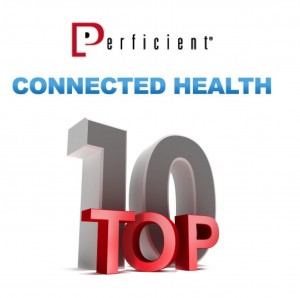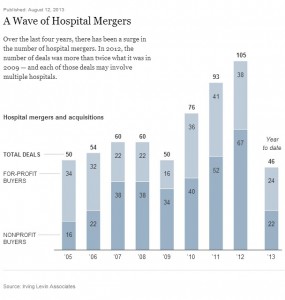
Connected Health is that always dynamic space where we connect patients, providers, insurers, and the health community at large in an effort to deliver quality care that is not confined to the mere 1% of time patients spend in the clinic care setting. It’s healthcare that braves the whirlwind of daily life with the goal of providing guidance and care when it is needed at home, at work, at school, in the community, and, even, around the world.
2014 will be an exciting year for those of us that make Connected Health our mission. Please join us as we count down the top 10 Connected Health trends that are expected to greet us this year. Today we kick off the list with:
Trend #10: M&A Meets Consumer Engagement
Hospitals across the United States are currently swept up in an avalanche of mergers unlike any we have seen in the last two decades. The small regional hospital is becoming an endangered species in this time of giant hospitals systems. The number of acquisitions has surged in the past four years and continues to grow at a fast pace. In 2012, the number of deals was more than double that seen in 2009, and it is predicted that within the next five to seven years approximately 1,000 of the nation’s 5,000 hospitals could seek out a merger.

Image Source: New York Times, “New Laws and Rising Costs Create a Surge of Supersizing Hospitals,” August 12, 2013
These consolidations are being driven by a confluence of powerful forces. Affordable Care leads the pack but other goals of merger include:
- Increase negotiating clout with insurers
- Improve care
- Reduce costs. However, some economists and health insurance companies worry that this trend could raise healthcare costs.
So how does this rapidly condensing healthcare environment impact Connected Health? The impact is largely two fold:
Combined Voice
As mentioned above, by combining, hospitals can reduce costs in terms of back-office activities. One of the back office costs of note to Connected Health is the public facing voice. Healthcare organizations that merge legally also need to merge brands, content provided on the public facing website(s), social media profiles, etc.
A typical evolution is as follows:
- larger system acquires a smaller regional hospital
- the amount of content and collaboration with patients served by that small regional hospital increases due to higher available investment through consolidation.
Simply put, the big systems often provide better content and communication through the public website and social media than a small regional hospital is capable of providing alone.
Larger Population Net
What does this combined voice mean in terms of population health? Whether it is a national chain of hospitals across the country or a grouping of hospitals in a specific geography, providing more and better web content and more outreach through social media can have a profound impact on managing wellness throughout a population.
Let me provide you with one of my favorite recent examples. Forrest Health, once a single hospital, is now a family of five hospitals in southern Mississippi. Where social media is concerned, they get many things right. Their Women & Children outreach is my favorite. They use social media to parlay news, health insights, and community spirit throughout their population. These efforts are then well tied to multiple “hard wired” in person outreach programs including a popular club for preteen and teen girls called Spirit Girls and another for young girls called, prepare yourself for an abundance of cuteness, the Sweet Teas.
Please stay tuned for the remainder of our series to see what trend reaches the #1 spot. Comment below on what you think the biggest trend could be.
- Connected Health Trend #10: M&A Meets Consumer Engagement
- Connected Health Trend #9: The Connected Enterprise
- Connected Health Trend #8: Sharing Notes with Patients
- Connected Health Trend #7: Care Knows No Bounds
- Connected Health Trend #6: Evolution of Social Media
- Connected Health Trend #5: The Meaningful Use Timeline
- Connected Health Trend #4: Reaching the Mobile 91%
- Connected Health Trend #3: Moving Beyond “Sick Care”
